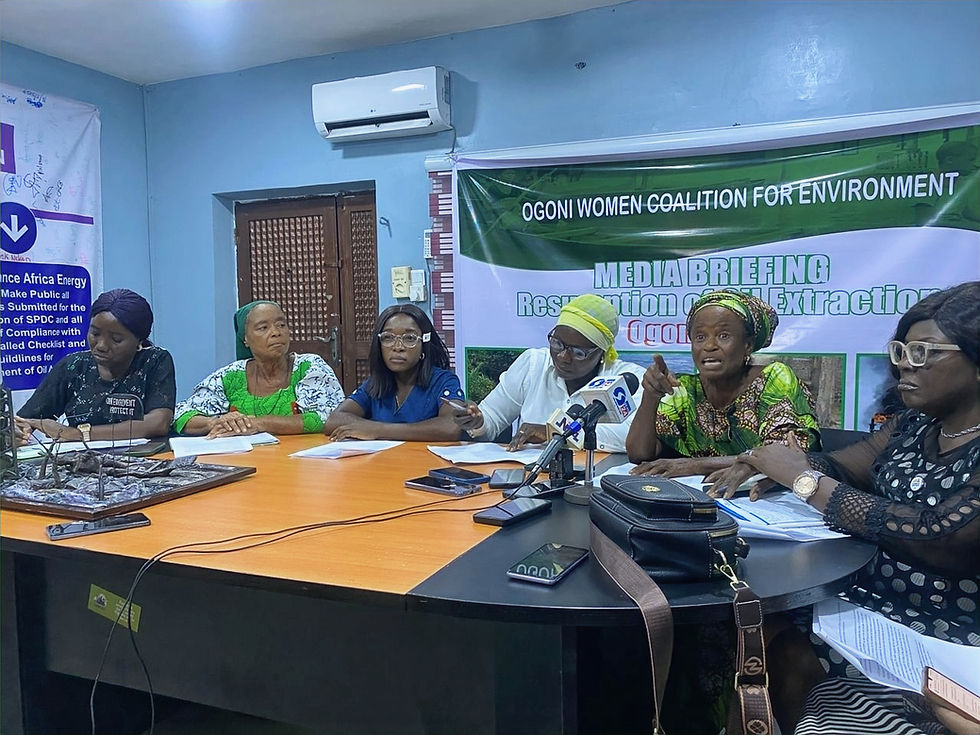Ogoni Oil Again in the Eye of the Storm, as Ogoni Women Stand Against Oil Resumption in their Land
- Nsemeke Fabian Asanga

- Feb 25
- 4 min read
Updated: Aug 5
- Nsemeke Fabian Asanga
In 1958, Ogoniland emerged as a focal area within Nigeria's growing oil economy, contributing major revenues to the country’s economy. Unfortunately, the benefits from oil resources have not reached Ogoni people, particularly the women in any significant measure. Rather, Ogoni women and its communities have for decades borne the impacts of the industry's adverse activities.
In 1970, Ogoniland witnessed Nigeria’s first major oil spill arising from an error by Shell, a spill that continued for 3 whole weeks with devastating consequences for the livelihoods of the people. Since then, oil spills and blowouts have occurred on a regular basis in Ogoniland. Estimates have that in the 15-year period between 1976 and 1991, there were 2,976 recorded oil spills in Ogoniland.

It was this level of neglect and ecological destruction that led to the adoption of the 1990 Ogoni Bill of Rights, a landmark document demanding the right of the Ogoni people to protect their environment and ecology from further degradation. Among others, the bill describes the Ogoni case as a ‘genocide being committed in the dying years of the twentieth century by multinational oil companies under the supervision of the Government of the Federal Republic of Nigeria.”
In 1993, Shell was forced out of Ogoniland where it had extracted crude oil non-stop for decades with unbelievable ecological consequences. The Ogoni people, mobilized under the Movement for the Survival of Ogoni People (MOSOP), called the attention of the world to the poverty, neglect, and environmental destruction that decades of oil exploitation had bequeathed on the Ogoni people. MOSOP demanded fairer benefits to the Ogoni people from oil wealth, as well as remediation and compensation for the ecological damage caused by the reckless activities of oil companies.
The Nigerian military government responded to the demands and non-violent protests of the people with vicious repression. A military operation was initiated in Ogoniland, a move that resulted in mass killings, arson, and the eventual execution of environmental rights activists Ken Saro-Wiwa, Saturday Dobee, Nordu Eawo, Daniel Gbooko, Paul Levera, Felix Nuate, Baribor Bera, Barinem Kiobel, in 1995 after the recommendations of a stage-managed trial.
It is disconcerting that in the ongoing frenzy to resume oil extraction in Ogoniland, the concerns raised in the Bill of Rights, which led to the termination of oil extraction and the repression of the people, have not been addressed. Similarly, there has been no attempt to secure justice for the countless families that lost lives, livelihoods, and properties in what is still the worst attack on a peaceful indigenous population by Nigerian security forces. Persons who committed acts of genocide and abuses against unarmed populations, and boasted publicly about it, have still not been brought to justice. For the majority of Ogonis, the events of the 1990s remain an open and sour wound, begging for the healing of truth and justice.
Critical to this is the fact that the moves to resume the extraction of oil in Ogoniland is happening against the backdrop of the clean-up of polluted sites in Ogoni. In 2012, the Hydrocarbon Pollution Remediation Project (HYPREP) was setup to lead and coordinate the activities needed to implement the recommendations of the UNEP report on oil contamination in Ogoniland, including cleanup activities. It is worrying why the government will decide to resume oil extraction in Ogoniland when the pollution of the last decades is yet to be cleaned and the recommendations of UNEP are yet to be fully complied with. How does one explain the fact that a site supposedly being cleaned up will resume full oil extraction activities with all the pollution that comes with it?
We, the Ogoni women, are deeply concerned about the neglect of key issues around ecological and social justice in Ogoniland. The world recognizes that the people of Ogoni have suffered unprecedented pains and losses on account of oil extraction. No apology has been rendered for the destruction of their environment, the killing of their people, the loss of their livelihoods, the destruction of their villages, the forced exile of their people, and the murder of their leaders. To assume that the extraction of oil can commence whilst these issues remain on the front burner is to be naïve at best and cruel at worst.

Flowing from the foregoing, it is our recommendation that the government put a stop to any planned attempt to resume oil activities in Ogoniland. It should rather concentrate on redeeming the ecological disaster in the area, decommissioning aged oil infrastructure, replacing the lost livelihood of the people, and securing justice for the countless Ogonis waiting for closure.
This is was signed by different women's groups in the Ogoni region and there are the Mba Okase Initiative, Eeedee Ladies of Tai, De Voice of Eleme Women Association, League of Queens Intl., Gbogbia Women Feefeelo, Lekeh Development Foundation, We The People, Kebetkache Women Development & Resource Centre, Global Concern Women and Youth Development Initiative, Miideekor Environmental Development Initiative, Concern Ogoni Daughter, Peoples Advancement Centre, Ogoni Women Coalition for Sustainable Environment, OWERDI, Yerebaneko Women Group of Tai, Ogoni Women Development Initiative, Society for Women and Youths Affairs (SWAYA)





Comments